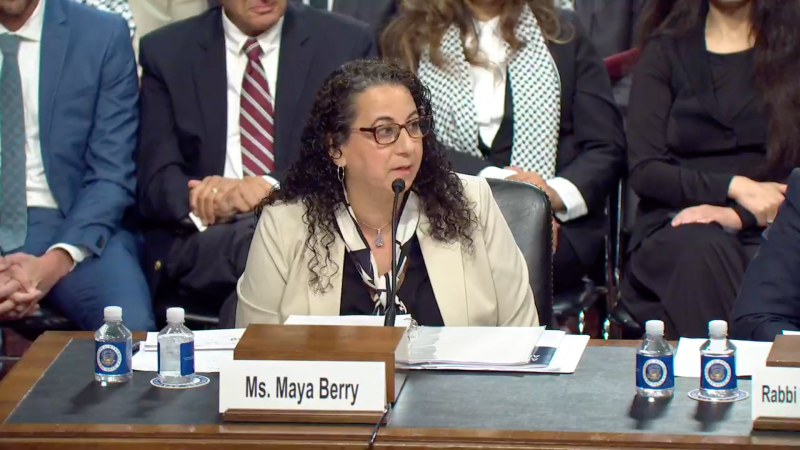A Senate Republican badgered an Arab American activist Tuesday during a congressional hearing about hate crimes with questions about whether she supported terrorist organizations, finally telling her that she should “hide your head in a bag.”
Sen. John Neely Kennedy of Louisiana questioned Arab American Institute Executive Director Maya Berry during a Senate Judiciary Committee hearing, asking her whether she supported Hamas, Hezbollah or Iran as she repeatedly told him no. Berry tried to explain how assuming that an Arab American would support a foreign terrorist organization or state was an example of the kind of thinking that leads to hate crimes but was repeatedly cut off by Kennedy.
“I didn’t expect a direct racist attack,” Berry told The Washington Post on Wednesday.
Kennedy’s office did not immediately respond Wednesday to requests for comment from The Post.
Kennedy questioned Berry as part of a hearing titled “A Threat to Justice Everywhere: Stemming the Tide of Hate Crimes in America.” The other witnesses who testified were Mark Goldfeder, director of the National Jewish Advocacy Center, and Kenneth Stern, director of the Bard Center for the Study of Hate.
The hearing came nearly a year after the Oct. 7 Hamas attack, which killed about 1,200 people and sparked an ongoing Israeli military campaign that has killed tens of thousands of Palestinians.
Hate crimes against Arabs and Jews have spiked in the United States. Berry, who co-chairs the Leadership Conference of Civil and Human Rights hate crimes task force, told lawmakers that while hate crimes ticked up 7 percent between 2022 and last year, those against Arabs and Jews spiked by 73 percent and 58 percent, respectively.
Perhaps anticipating questions like Kennedy’s, Berry encouraged senators, despite their concerns about the Oct. 7 attacks, to focus on “the increase in hate crimes our country has experienced for nearly the last decade and the need for a whole-of-society approach that can effectively stem the tide of all hate targeting all communities.”
“By focusing on hate crime statistics, the federal government’s role in hate crime enforcement, and recommendations for policy remedies, I hope my testimony can help inform our collective response to combat all forms of hate,” she said.
Kennedy did not take her up on her suggestion. Instead, one of his first questions to her was “You support Hamas, do you not?” causing murmurs in the audience.
“Senator, oddly enough, I’m going to say thank you for that question, because it demonstrates the purpose of our hearing today in a very effective way,” Berry replied.
”Let’s start with a yes or no,” Kennedy said.
“Hamas is a foreign terrorist organization that I do not support, but you asking the executive director of the Arab American Institute that question very much puts the focus on the issue of hate in our country,” she said to applause from the audience.
Kennedy then asked if she supported Hezbollah, an Iranian-backed militia based in Lebanon that the United States has classified as a terrorist organization. Berry told him that she found his questions “extraordinarily disappointing.”
“I don’t support violence, whether it’s Hezbollah, Hamas or any other entity that invokes it, so, no sir,” Berry said.
“You can’t bring yourself to say no, can you?” Kennedy replied with a smile. “You just can’t bring yourself to do it.”
Kennedy then asked her if she supported Iran and “their hatred of Jews?” Berry said no.
Kennedy asked Berry about her criticizing the United States for cutting off funding to the United Nations Relief and Works Agency, which provides aid to Palestinian refugees. The United States did so because Israel in January alleged that a dozen of the agency’s 13,000 employees in Gaza participated in the Oct. 7 attacks. In April, an independent review found that Israel had not provided evidence that a significant number of UNRWA’s workers were tied to militant groups, while the leader of the review group called the agency “indispensable and irreplaceable.”
Kennedy wrapped up his questioning by returning to where he started.
“Let me ask you one more time, you support Hamas, don’t you? You support UNRWA and Hamas, don’t you?”
“I think it’s exceptionally disappointing that you’re looking at an Arab American witness before you and saying you support Hamas,” Berry said. “I do not support Hamas.”
“You know what’s disappointing to me? You can’t bring yourself to say don’t support UNRWA, you don’t support Hamas, you don’t support Hezbollah and you don’t support Iran,” Kennedy said, incorrectly. “You should hide your head in a bag.”
The crowd gasped.
Judiciary Committee Chair Dick Durbin (D-Ill.) gave Berry an opportunity to respond to Kennedy’s comments. Asked if she wanted to say anything, Berry said that it was “regrettable that I, as I sit here, have experienced the very issue that we’re attempting to deal with today.”
“The introduction of foreign policy is not how we keep Arab Americans or Jewish Americans or Muslim Americans or Black people or Asian Americans — anybody safe,” she added. “This has been regrettably a real disappointment but very much an indication of the danger to our democratic institutions that we’re in now.”
On Wednesday, Berry told The Post that the hearing was about the increase in hate crimes in recent years, not just against Arabs and Jews and not just since the Oct. 7 attacks. She said she tried to stay focused on that because it’s important for lawmakers who have oversight power over the Justice Department to know what’s going on, all the more so because of debunked rumors of immigrants in Springfield, Ohio, eating pets and threats of violence that followed.
“We’re in the middle of seeing that right now unfold with Haitian American communities,” Berry said.
Instead, the hearing became mired in discussing foreign policy, she said, adding that Kennedy and other lawmakers hijacked the conversation from talking about hate crimes but also used the same kind of racist rhetoric that leads to hate crimes.
“I am genuinely worried about our democratic institutions,” she said.

